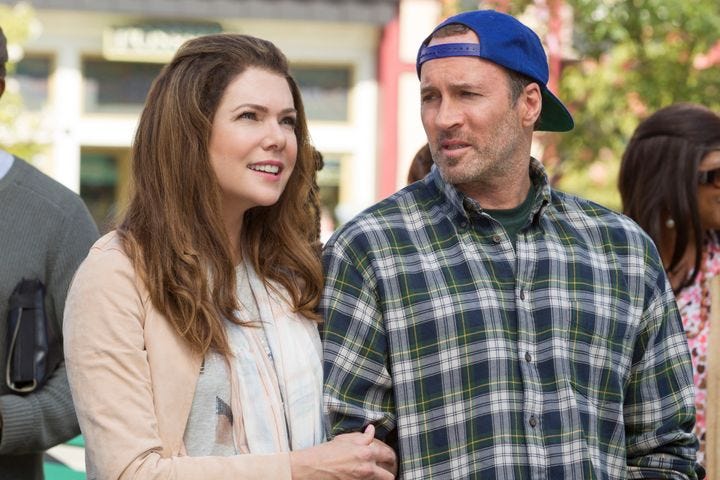It's okay for a man to shrug it off when women talk about his butt
On the different calculi of men and women
Odds are you probably don’t know that you know who Scott Patterson is: He’s one of those actors whose mien is such that you recognize that you sort of recognize him, but you also don’t remember from where, but if someone told you he was in Gilmore Girls you’d be like, “Oh, yeah,” even if you’ve never seen Gilmore Girls. That’s just the way it is sometimes.
You might also be surprised to learn that Scott Patterson—who is a pretty big, brawny dude, indeed whose brawny working-class countenance was part of his whole shtick on Gilmore Girls̛—is really upset that a couple of women talked about his buttocks like twenty years ago:
The actor said he was “shocked” by an exchange between Lorelai (Lauren Graham) and Sookie (Melissa McCarthy), in which they admire [character Luke Danes’s] butt after the latter accidentally rests her hand on his backside. And, in typical Gilmore fashion, Lorelai fully commits to the bit, proceeding to mention her future husband’s behind multiple times throughout the scene.
“That was disturbing. I realized it wasn’t OK, and it didn’t make me feel comfortable at all. It made me feel really embarrassed, actually,” Patterson said on a recent episode of his “I Am All In” podcast. “It is infuriating to be treated that way — it is infuriating — because you’re being treated like an object. It’s disturbing, and it’s disgusting. And I had to endure that through that entire scene and many takes.” …
“It’s never OK. And I didn’t feel comfortable doing it and it pissed me off.”
Now, your first reasonable impression here is probably to say, “Um, it was a television show. You were all acting. You aren’t actually Luke Danes.” And you’d be right! But beyond that, the more pointed response here would be: “Uh, you’re a man. Get over it.”
Seriously. It’s okay to say that. I know that we live in a cultural moment where we’re supposed to, you know, “validate” everyone’s “trauma” or whatever, but when a big strong man says it was “infuriating” that some women talked about his butt in the context of a fictional character he was playing—and when he’s still burned up about it 20 years later—well, you have to draw the line somewhere.
I think most of us are instinctively repulsed when men behave as Scott Patterson is behaving now, and I think it’s worth examining why that is. It is true that this type of behavior appears to many of us as weak, whiny, effeminate, unmanly. But then we simply have to further ask ourselves why we find that sort of thing so instinctually repellant. How come we’d be less repulsed if it were a woman making these remarks?
The difference lies in the different risk ratios respective to men and women. Simply put, if a man is subject to the kind of unpleasant sexualized scrutiny to which Scott Patterson is referring, he has more options at his disposal than a woman in a similar situation. A man, being on average significantly stronger than most women, faces essentially no threat that uncouth behavior from women will spiral into a physical and/or violent situation, at least not one that he can’t easily deal with. And moreover, he knows that if he wants to he can tell her to shut up or screw off and he won’t have to worry about invoking a physical response in which he is outmatched.
Women are not so advantageously positioned in these situations. Women historically have formed the overwhelming majority of sexual assault victims—more than nine out of every 10, by reliable measures—and a woman tends to recognize, correctly, that unpleasant sexual attention may very well be a gateway to something much worse, possibly life-threatening, and that the average man will likely be able to overpower her if things get physical.
Now, obviously, if the sexes had been reversed, and it had been Lauren Graham’s butt that a couple of guys were talking about, the actress could have easily recognized that she was under no threat of sexual assault in the moment. But her instinctual revulsion and irritation would have been completely understandable given the situation. All of which is why we traditionally place such opprobrium on the sexual harassment of women and less of it on that of men.
Society has developed these lopsided sexual safeguards in deference to the very distinct qualities embodied by both men and women. We afford women considerably more latitude of feeling when it comes to this sort of thing. Scott Patterson is thus effectively encroaching on a set of prerogatives that are not really his by right; by asking us to sympathize with his feeling “infuriated” and “disgusted” at a situation in which neither was warranted, he is in effect devaluing the legitimate vulnerabilities to which women have intrinsic and completely justifiable claims, in the same way that, say, declaring all pennies to suddenly be worth 5¢ would do little except devalue the nickel.
All of which is a very roundabout and lengthy way of saying: Be a man about it. No, you don’t have to enjoy your co-workers talking about your butt, even in the context of your acting work. I get it, I wouldn’t be too crazy about it either. You can just say, “Yeah, there was this one scene, it was kind of awkward having my butt talked about by a woman who wasn’t my wife. Not my ideal way to spend my working hours.” And then move on.
If you’re still all bent up out of shape about it twenty years later, you have some hang-ups that go beyond a couple of actresses talking about your cheeks for a few takes. “It’s never okay.” Yeah, but sometimes it’s, you know, not that big of a deal either. Man up.



